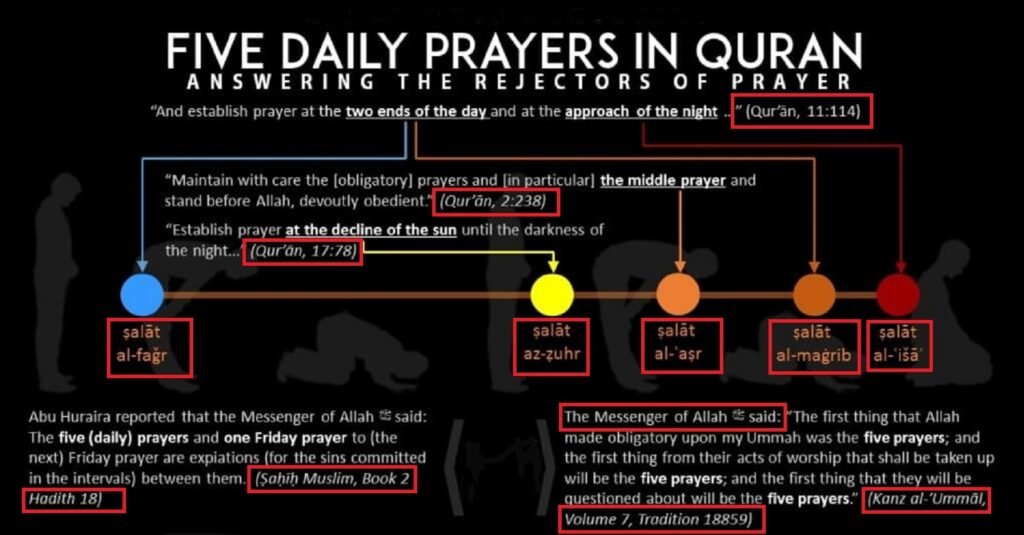𝐖𝐡𝐲 𝐈𝐬 𝐏𝐫𝐨𝐩𝐡𝐞𝐭 𝐌𝐮𝐡𝐚𝐦𝐦𝐚𝐝 𝐌𝐞𝐧𝐭𝐢𝐨𝐧𝐞𝐝 𝐢𝐧 𝐭𝐡𝐞 𝐒𝐡𝐚𝐡𝐚𝐝𝐚𝐡?
Mohamad Mostafa Nassar
Twitter:@NassarMohamadMR

𝐓𝐡𝐞𝐫𝐞 𝐚𝐫𝐞 𝐦𝐚𝐢𝐧𝐥𝐲 𝐭𝐰𝐨 𝐚𝐬𝐩𝐞𝐜𝐭𝐬 𝐨𝐟 𝐭𝐡𝐞 𝐬𝐢𝐠𝐧𝐢𝐟𝐢𝐜𝐚𝐧𝐜𝐞 𝐨𝐟 𝐭𝐡𝐞 𝐬𝐞𝐜𝐨𝐧𝐝 𝐩𝐚𝐫𝐭 𝐨𝐟 𝐭𝐡𝐞 𝐒𝐡𝐚𝐡𝐚𝐝𝐚𝐡, 𝐧𝐚𝐦𝐞𝐥𝐲: “𝐌𝐮𝐡𝐚𝐦𝐦𝐚𝐝 𝐢𝐬 𝐭𝐡𝐞 𝐌𝐞𝐬𝐬𝐞𝐧𝐠𝐞𝐫 (𝐏𝐫𝐨𝐩𝐡𝐞𝐭) 𝐨𝐟 𝐀𝐥𝐥𝐚𝐡”.
𝐏𝐫𝐨𝐩𝐡𝐞𝐭 𝐌𝐮𝐡𝐚𝐦𝐦𝐚𝐝 𝐂𝐚𝐦𝐞 𝐰𝐢𝐭𝐡 𝐭𝐡𝐞 𝐅𝐢𝐧𝐚𝐥 𝐑𝐞𝐯𝐞𝐥𝐚𝐭𝐢𝐨𝐧
𝐅𝐢𝐫𝐬𝐭: 𝐀𝐥𝐥𝐚𝐡 𝐀𝐥𝐦𝐢𝐠𝐡𝐭𝐲 𝐢𝐬 𝐭𝐡𝐞 𝐓𝐫𝐚𝐧𝐬𝐜𝐞𝐧𝐝𝐞𝐧𝐭𝐚𝐥 𝐂𝐫𝐞𝐚𝐭𝐨𝐫 𝐚𝐧𝐝 𝐒𝐮𝐬𝐭𝐚𝐢𝐧𝐞𝐫 𝐨𝐟 𝐭𝐡𝐞 𝐮𝐧𝐢𝐯𝐞𝐫𝐬𝐞, 𝐰𝐡𝐨 𝐝𝐨𝐞𝐬 𝐧𝐨𝐭 ‘𝐦𝐚𝐭𝐞𝐫𝐢𝐚𝐥𝐢𝐳𝐞’ 𝐨𝐫 𝐚𝐩𝐩𝐞𝐚𝐫 𝐛𝐞𝐟𝐨𝐫𝐞 𝐮𝐬.
𝐖𝐞 𝐥𝐞𝐚𝐫𝐧 𝐚𝐛𝐨𝐮𝐭 𝐀𝐥𝐥𝐚𝐡 𝐚𝐧𝐝 𝐇𝐢𝐬 𝐠𝐮𝐢𝐝𝐚𝐧𝐜𝐞 𝐭𝐡𝐫𝐨𝐮𝐠𝐡 𝐭𝐡𝐞 𝐌𝐞𝐬𝐬𝐞𝐧𝐠𝐞𝐫 𝐰𝐡𝐨 𝐀𝐥𝐥𝐚𝐡 𝐇𝐢𝐦𝐬𝐞𝐥𝐟 𝐜𝐡𝐨𝐬𝐞.
𝐓𝐡𝐢𝐬 𝐚𝐩𝐩𝐥𝐢𝐞𝐬 𝐭𝐨 𝐚𝐥𝐥 𝐭𝐡𝐞 𝐌𝐞𝐬𝐬𝐞𝐧𝐠𝐞𝐫𝐬 𝐨𝐟 𝐀𝐥𝐥𝐚𝐡, 𝐧𝐨𝐭 𝐨𝐧𝐥𝐲 𝐭𝐨 𝐌𝐮𝐡𝐚𝐦𝐦𝐚𝐝 (𝐩𝐞𝐚𝐜𝐞 𝐛𝐞 𝐮𝐩𝐨𝐧 𝐡𝐢𝐦).
𝐁𝐮𝐭 𝐌𝐮𝐡𝐚𝐦𝐦𝐚𝐝 (𝐩𝐞𝐚𝐜𝐞 𝐛𝐞 𝐮𝐩𝐨𝐧 𝐡𝐢𝐦) 𝐢𝐬 𝐭𝐡𝐞 𝐅𝐢𝐧𝐚𝐥 𝐌𝐞𝐬𝐬𝐞𝐧𝐠𝐞𝐫 𝐨𝐟 𝐀𝐥𝐥𝐚𝐡 𝐰𝐡𝐨 𝐜𝐚𝐦𝐞 𝐭𝐨 𝐜𝐨𝐨𝐫𝐝𝐢𝐧𝐚𝐭𝐞, 𝐜𝐨𝐧𝐟𝐢𝐫𝐦 𝐚𝐧𝐝 𝐜𝐨𝐦𝐩𝐥𝐞𝐭𝐞 𝐭𝐡𝐞 𝐞𝐚𝐫𝐥𝐢𝐞𝐫 𝐦𝐞𝐬𝐬𝐚𝐠𝐞𝐬.
𝐒𝐨, 𝐡𝐞 𝐢𝐬 𝐧𝐨𝐭 𝐣𝐮𝐬𝐭 𝐨𝐧𝐞 𝐦𝐞𝐬𝐬𝐞𝐧𝐠𝐞𝐫 𝐚𝐦𝐨𝐧𝐠 𝐦𝐚𝐧𝐲; 𝐫𝐚𝐭𝐡𝐞𝐫 𝐡𝐞 𝐫𝐞𝐩𝐫𝐞𝐬𝐞𝐧𝐭𝐬 𝐚𝐥𝐥 𝐭𝐡𝐞 𝐌𝐞𝐬𝐬𝐞𝐧𝐠𝐞𝐫𝐬 𝐨𝐟 𝐀𝐥𝐥𝐚𝐡 𝐛𝐞𝐟𝐨𝐫𝐞 𝐡𝐢𝐦.
𝐌𝐮𝐡𝐚𝐦𝐦𝐚𝐝 𝐟𝐮𝐥𝐟𝐢𝐥𝐥𝐬 𝐚𝐧𝐝 𝐫𝐞𝐯𝐚𝐥𝐢𝐝𝐚𝐭𝐞𝐬 𝐚𝐥𝐥 𝐭𝐡𝐞 𝐞𝐚𝐫𝐥𝐢𝐞𝐫 𝐦𝐞𝐬𝐬𝐚𝐠𝐞𝐬 𝐭𝐡𝐫𝐨𝐮𝐠𝐡 𝐡𝐢𝐬 𝐦𝐢𝐬𝐬𝐢𝐨𝐧. 𝐓𝐡𝐮𝐬, 𝐡𝐞 𝐬𝐭𝐚𝐧𝐝𝐬 𝐟𝐨𝐫 𝐭𝐡𝐞 𝐜𝐨𝐦𝐩𝐥𝐞𝐭𝐢𝐨𝐧 𝐨𝐟 𝐀𝐥𝐥𝐚𝐡’𝐬 𝐠𝐮𝐢𝐝𝐚𝐧𝐜𝐞 𝐟𝐨𝐫 𝐦𝐚𝐧𝐤𝐢𝐧𝐝.
𝐏𝐫𝐨𝐩𝐡𝐞𝐭 𝐌𝐮𝐡𝐚𝐦𝐦𝐚𝐝 𝐖𝐚𝐬 𝐭𝐡𝐞 𝐋𝐢𝐯𝐢𝐧𝐠 𝐐𝐮𝐫𝐚𝐧
𝐒𝐞𝐜𝐨𝐧𝐝: 𝐆𝐨𝐝’𝐬 𝐠𝐮𝐢𝐝𝐚𝐧𝐜𝐞 𝐢𝐬 𝐧𝐨𝐭 𝐣𝐮𝐬𝐭 𝐟𝐨𝐫 𝐨𝐮𝐫 𝐚𝐜𝐚𝐝𝐞𝐦𝐢𝐜 𝐬𝐭𝐮𝐝𝐲, 𝐛𝐮𝐭 𝐟𝐨𝐫 𝐨𝐮𝐫 𝐚𝐩𝐩𝐥𝐲𝐢𝐧𝐠 𝐢𝐭 𝐢𝐧 𝐬𝐩𝐚𝐜𝐞 𝐚𝐧𝐝 𝐭𝐢𝐦𝐞.
𝐓𝐡𝐞 𝐫𝐨𝐥𝐞 𝐨𝐟 𝐏𝐫𝐨𝐩𝐡𝐞𝐭 𝐌𝐮𝐡𝐚𝐦𝐦𝐚𝐝 𝐢𝐬 𝐧𝐨𝐭 𝐦𝐞𝐫𝐞𝐥𝐲 𝐭𝐨 𝐭𝐞𝐚𝐜𝐡 𝐮𝐬, 𝐛𝐮𝐭 𝐭𝐨 𝐩𝐫𝐚𝐜𝐭𝐢𝐜𝐚𝐥𝐥𝐲 𝐝𝐞𝐦𝐨𝐧𝐬𝐭𝐫𝐚𝐭𝐞 𝐭𝐨 𝐮𝐬 𝐡𝐨𝐰 𝐰𝐞 𝐜𝐚𝐧 𝐥𝐢𝐯𝐞 𝐛𝐲 𝐆𝐨𝐝’𝐬 𝐠𝐮𝐢𝐝𝐚𝐧𝐜𝐞.
𝐓𝐡𝐢𝐬 𝐦𝐞𝐚𝐧𝐬 𝐭𝐡𝐚𝐭 𝐭𝐡𝐞 𝐐𝐮𝐫𝐚𝐧 𝐢𝐬, 𝐚𝐬 𝐢𝐭 𝐰𝐞𝐫𝐞, 𝐭𝐡𝐞 ‘𝐭𝐡𝐞𝐨𝐫𝐲’; 𝐚𝐧𝐝 𝐭𝐡𝐞 𝐒𝐮𝐧𝐧𝐚𝐡 (𝐭𝐡𝐞 𝐞𝐱𝐚𝐦𝐩𝐥𝐞 𝐨𝐟 𝐏𝐫𝐨𝐩𝐡𝐞𝐭 𝐌𝐮𝐡𝐚𝐦𝐦𝐚𝐝) 𝐢𝐬 𝐭𝐡𝐞 ‘𝐩𝐫𝐚𝐜𝐭𝐢𝐜𝐚𝐥 𝐟𝐨𝐫𝐦’ 𝐨𝐟 𝐭𝐡𝐚𝐭 𝐭𝐡𝐞𝐨𝐫𝐲.
𝐈𝐬𝐥𝐚𝐦 𝐚𝐟𝐟𝐢𝐫𝐦𝐬 𝐚𝐧𝐝 𝐮𝐧𝐝𝐞𝐫𝐬𝐜𝐨𝐫𝐞𝐬 𝐭𝐡𝐞 𝐢𝐦𝐩𝐨𝐫𝐭𝐚𝐧𝐜𝐞 𝐨𝐟 𝐭𝐡𝐞 𝐐𝐮𝐫𝐚𝐧 (𝐭𝐡𝐞 𝐩𝐫𝐞𝐜𝐞𝐩𝐭) 𝐚𝐧𝐝 𝐭𝐡𝐞 𝐒𝐮𝐧𝐧𝐚𝐡 (𝐭𝐡𝐞 𝐞𝐱𝐚𝐦𝐩𝐥𝐞) 𝐭𝐨𝐠𝐞𝐭𝐡𝐞𝐫.
𝐓𝐡𝐢𝐬 𝐩𝐨𝐢𝐧𝐭𝐬 𝐭𝐨 𝐭𝐡𝐞 𝐟𝐚𝐜𝐭 𝐭𝐡𝐚𝐭 𝐢𝐭 𝐢𝐬 𝐧𝐨𝐭 𝐞𝐧𝐨𝐮𝐠𝐡 𝐟𝐨𝐫 𝐮𝐬 𝐣𝐮𝐬𝐭 𝐭𝐨 ‘𝐰𝐨𝐫𝐬𝐡𝐢𝐩’ 𝐆𝐨𝐝 𝐚𝐬 𝐚𝐧 𝐚𝐬𝐜𝐞𝐭𝐢𝐜 𝐝𝐞𝐯𝐨𝐭𝐞𝐞 𝐰𝐨𝐮𝐥𝐝; 𝐛𝐮𝐭 𝐚𝐥𝐬𝐨, 𝐭𝐨 𝐥𝐢𝐯𝐞 𝐡𝐞𝐫𝐞 𝐚𝐬 𝐦𝐞𝐦𝐛𝐞𝐫𝐬 𝐨𝐟 𝐡𝐮𝐦𝐚𝐧 𝐬𝐨𝐜𝐢𝐞𝐭𝐲, 𝐦𝐚𝐤𝐢𝐧𝐠 𝐮𝐬𝐞 𝐨𝐟 𝐭𝐡𝐞 𝐛𝐥𝐞𝐬𝐬𝐢𝐧𝐠𝐬 𝐆𝐨𝐝 𝐡𝐚𝐬 𝐠𝐢𝐯𝐞𝐧 𝐮𝐬, 𝐚𝐧𝐝 𝐨𝐛𝐬𝐞𝐫𝐯𝐢𝐧𝐠 𝐭𝐡𝐞 𝐥𝐢𝐦𝐢𝐭𝐬 𝐬𝐞𝐭 𝐛𝐲 𝐆𝐨𝐝.
𝐅𝐨𝐫 𝐭𝐡𝐢𝐬 𝐩𝐮𝐫𝐩𝐨𝐬𝐞, 𝐰𝐞 𝐧𝐞𝐞𝐝 𝐚 𝐩𝐫𝐚𝐜𝐭𝐢𝐜𝐚𝐥 𝐦𝐨𝐝𝐞𝐥 𝐰𝐡𝐨 𝐰𝐨𝐮𝐥𝐝 𝐧𝐨𝐭 𝐨𝐧𝐥𝐲 𝐜𝐨𝐧𝐯𝐞𝐲 𝐆𝐨𝐝’𝐬 𝐦𝐞𝐬𝐬𝐚𝐠𝐞 𝐭𝐨 𝐮𝐬, 𝐛𝐮𝐭 𝐚𝐥𝐬𝐨 𝐋𝐈𝐕𝐄 𝐭𝐡𝐚𝐭 𝐦𝐞𝐬𝐬𝐚𝐠𝐞 𝐡𝐞𝐫𝐞 𝐛𝐞𝐥𝐨𝐰, 𝐚𝐬 𝐆𝐨𝐝 𝐰𝐚𝐧𝐭𝐬 𝐮𝐬 𝐭𝐨 𝐥𝐢𝐯𝐞 𝐢𝐭.
𝐘𝐨𝐮 𝐦𝐚𝐲 𝐤𝐧𝐨𝐰 𝐭𝐡𝐞 𝐆𝐨𝐬𝐩𝐞𝐥 𝐯𝐞𝐫𝐬𝐞 𝐭𝐡𝐚𝐭 𝐢𝐬 𝐠𝐞𝐧𝐞𝐫𝐚𝐥𝐥𝐲 𝐦𝐢𝐬𝐢𝐧𝐭𝐞𝐫𝐩𝐫𝐞𝐭𝐞𝐝 𝐛𝐲 𝐭𝐡𝐞 𝐂𝐡𝐫𝐢𝐬𝐭𝐢𝐚𝐧𝐬 𝐚𝐛𝐨𝐮𝐭 𝐉𝐞𝐬𝐮𝐬: “𝐇𝐞 𝐭𝐡𝐚𝐭 𝐡𝐚𝐭𝐡 𝐬𝐞𝐞𝐧 𝐦𝐞 𝐡𝐚𝐭𝐡 𝐬𝐞𝐞𝐧 𝐭𝐡𝐞 𝐅𝐚𝐭𝐡𝐞𝐫” (𝐉𝐨𝐡𝐧 𝟏𝟒:𝟗).
𝐉𝐞𝐬𝐮𝐬 𝐬𝐚𝐢𝐝 𝐭𝐡𝐢𝐬 𝐢𝐧 𝐚𝐧𝐬𝐰𝐞𝐫 𝐭𝐨 𝐏𝐡𝐢𝐥𝐢𝐩’𝐬 𝐝𝐞𝐦𝐚𝐧𝐝 𝐭𝐨 𝐬𝐞𝐞 𝐆𝐨𝐝. 𝐖𝐞 𝐡𝐮𝐦𝐚𝐧𝐬 𝐜𝐚𝐧𝐧𝐨𝐭 𝐬𝐞𝐞 𝐆𝐨𝐝; 𝐰𝐞 𝐜𝐚𝐧 𝐨𝐧𝐥𝐲 𝐬𝐞𝐞 𝐆𝐨𝐝’𝐬 𝐡𝐮𝐦𝐚𝐧 𝐦𝐞𝐬𝐬𝐞𝐧𝐠𝐞𝐫.
𝐓𝐡𝐢𝐬 𝐦𝐞𝐬𝐬𝐞𝐧𝐠𝐞𝐫’𝐬 𝐝𝐮𝐭𝐲 𝐢𝐬 𝐧𝐨𝐭 𝐨𝐧𝐥𝐲 𝐭𝐨 𝐜𝐨𝐧𝐯𝐞𝐲 𝐭𝐨 𝐮𝐬 𝐭𝐡𝐞 𝐰𝐨𝐫𝐝 𝐨𝐟 𝐆𝐨𝐝 𝐫𝐞𝐯𝐞𝐚𝐥𝐞𝐝 𝐭𝐨 𝐡𝐢𝐦, 𝐛𝐮𝐭 𝐚𝐥𝐬𝐨 𝐭𝐨 𝐝𝐞𝐦𝐨𝐧𝐬𝐭𝐫𝐚𝐭𝐞 𝐭𝐨 𝐩𝐞𝐨𝐩𝐥𝐞 𝐡𝐨𝐰 𝐨𝐧𝐞 𝐜𝐚𝐧 𝐥𝐞𝐚𝐝 𝐚 𝐥𝐢𝐟𝐞 𝐨𝐟 𝐮𝐧𝐜𝐨𝐧𝐝𝐢𝐭𝐢𝐨𝐧𝐚𝐥 𝐬𝐮𝐛𝐦𝐢𝐬𝐬𝐢𝐨𝐧 𝐭𝐨 𝐆𝐨𝐝’𝐬 𝐰𝐢𝐥𝐥; 𝐬𝐞𝐞𝐧 𝐢𝐧 𝐭𝐡𝐞 𝐬𝐩𝐢𝐫𝐢𝐭 𝐨𝐟 𝐉𝐞𝐬𝐮𝐬’ 𝐟𝐚𝐦𝐨𝐮𝐬 𝐰𝐨𝐫𝐝𝐬 𝐨𝐟 𝐜𝐨𝐦𝐩𝐥𝐞𝐭𝐞 𝐬𝐮𝐫𝐫𝐞𝐧𝐝𝐞𝐫 𝐭𝐨 𝐆𝐨𝐝’𝐬 𝐰𝐢𝐥𝐥: “𝐍𝐨𝐭 𝐚𝐬 𝐈 𝐰𝐢𝐥𝐥, 𝐛𝐮𝐭 𝐚𝐬 𝐘𝐨𝐮 𝐰𝐢𝐥𝐥!” (𝐌𝐚𝐭𝐭𝐡𝐞𝐰 𝟐𝟔:𝟑𝟗)
𝐓𝐨 𝐅𝐨𝐥𝐥𝐨𝐰 𝐏𝐫𝐨𝐩𝐡𝐞𝐭 𝐌𝐮𝐡𝐚𝐦𝐦𝐚𝐝 𝐢𝐬 𝐭𝐨 𝐨𝐛𝐞𝐲 𝐀𝐥𝐥𝐚𝐡
𝐈𝐧 𝐬𝐡𝐨𝐫𝐭, 𝐭𝐡𝐞 𝐭𝐰𝐨 𝐩𝐚𝐫𝐭𝐬 𝐨𝐟 𝐭𝐡𝐞 𝐒𝐡𝐚𝐡𝐚𝐝𝐚𝐡 𝐚𝐫𝐞 𝐥𝐢𝐤𝐞 𝐭𝐡𝐞 𝐭𝐰𝐨 𝐬𝐢𝐝𝐞𝐬 𝐨𝐟 𝐭𝐡𝐞 𝐬𝐚𝐦𝐞 𝐜𝐨𝐢𝐧: 𝐎𝐧𝐞-𝐩𝐚𝐫𝐭 𝐬𝐭𝐚𝐭𝐞𝐬 𝐨𝐧𝐞’𝐬 𝐚𝐜𝐜𝐞𝐩𝐭𝐚𝐧𝐜𝐞 𝐨𝐟 𝐭𝐡𝐞 𝐎𝐧𝐞 𝐓𝐫𝐮𝐞 𝐆𝐨𝐝, 𝐰𝐡𝐢𝐜𝐡 𝐫𝐞𝐥𝐚𝐭𝐞𝐬 𝐭𝐨 𝐨𝐧𝐞’𝐬 𝐟𝐚𝐢𝐭𝐡 𝐚𝐧𝐝 𝐜𝐨𝐧𝐯𝐢𝐜𝐭𝐢𝐨𝐧, 𝐰𝐡𝐢𝐜𝐡 𝐢𝐬 𝐢𝐧𝐰𝐚𝐫𝐝.
𝐓𝐡𝐞 𝐨𝐭𝐡𝐞𝐫 𝐬𝐭𝐚𝐭𝐞𝐬 𝐨𝐧𝐞’𝐬 𝐚𝐜𝐜𝐞𝐩𝐭𝐚𝐧𝐜𝐞 𝐨𝐟 𝐆𝐨𝐝’𝐬 𝐌𝐞𝐬𝐬𝐞𝐧𝐠𝐞𝐫 𝐨𝐧 𝐞𝐚𝐫𝐭𝐡, 𝐰𝐡𝐢𝐜𝐡 𝐫𝐞𝐥𝐚𝐭𝐞𝐬 𝐭𝐨 𝐨𝐧𝐞’𝐬 𝐜𝐨𝐦𝐦𝐢𝐭𝐦𝐞𝐧𝐭 𝐭𝐨 𝐥𝐢𝐯𝐞 𝐢𝐧 𝐨𝐛𝐞𝐝𝐢𝐞𝐧𝐜𝐞 𝐭𝐨 𝐆𝐨𝐝’𝐬 𝐜𝐨𝐦𝐦𝐚𝐧𝐝𝐦𝐞𝐧𝐭𝐬, 𝐰𝐡𝐢𝐜𝐡 𝐞𝐱𝐩𝐫𝐞𝐬𝐬𝐞𝐬 𝐢𝐭𝐬𝐞𝐥𝐟 𝐢𝐧 𝐨𝐧𝐞’𝐬 𝐨𝐮𝐭𝐰𝐚𝐫𝐝 𝐥𝐢𝐟𝐞 𝐚𝐬 𝐥𝐢𝐯𝐞𝐝 𝐝𝐚𝐢𝐥𝐲.
𝐓𝐡𝐚𝐭 𝐢𝐬 𝐰𝐡𝐲 𝐀𝐥𝐥𝐚𝐡 𝐢𝐧 𝐭𝐡𝐞 𝐍𝐨𝐛𝐥𝐞 𝐐𝐮𝐫𝐚𝐧 𝐜𝐨𝐦𝐦𝐚𝐧𝐝𝐬:
𝐘𝐨𝐮 𝐰𝐡𝐨 𝐛𝐞𝐥𝐢𝐞𝐯𝐞! 𝐎𝐛𝐞𝐲 𝐀𝐥𝐥𝐚𝐡 𝐚𝐧𝐝 𝐇𝐢𝐬 𝐀𝐩𝐨𝐬𝐭𝐥𝐞… (𝐐𝐮𝐫𝐚𝐧 𝟖:𝟐𝟎)
𝐒𝐚𝐲: “𝐈𝐟 𝐲𝐨𝐮 𝐝𝐨 𝐥𝐨𝐯𝐞 𝐀𝐥𝐥𝐚𝐡, 𝐟𝐨𝐥𝐥𝐨𝐰 𝐦𝐞: 𝐀𝐥𝐥𝐚𝐡 𝐰𝐢𝐥𝐥 𝐥𝐨𝐯𝐞 𝐲𝐨𝐮 𝐚𝐧𝐝 𝐟𝐨𝐫𝐠𝐢𝐯𝐞 𝐲𝐨𝐮 𝐲𝐨𝐮𝐫 𝐬𝐢𝐧𝐬… (𝐐𝐮𝐫𝐚𝐧 𝟑:𝟑𝟏)
𝐇𝐞 𝐰𝐡𝐨 𝐨𝐛𝐞𝐲𝐬 𝐭𝐡𝐞 𝐀𝐩𝐨𝐬𝐭𝐥𝐞, 𝐨𝐛𝐞𝐲𝐬 𝐀𝐥𝐥𝐚𝐡… (𝐐𝐮𝐫𝐚𝐧 𝟒:𝟖𝟎)
𝐓𝐡𝐞𝐬𝐞 𝐯𝐞𝐫𝐬𝐞𝐬 𝐦𝐚𝐤𝐞 𝐜𝐥𝐞𝐚𝐫 𝐭𝐡𝐚𝐭 𝐭𝐡𝐞 𝐚𝐜𝐜𝐞𝐩𝐭𝐚𝐧𝐜𝐞 𝐨𝐟 𝐭𝐡𝐞 𝐏𝐫𝐨𝐩𝐡𝐞𝐭 𝐢𝐬 𝐭𝐡𝐞 𝐚𝐜𝐜𝐞𝐩𝐭𝐚𝐧𝐜𝐞 𝐨𝐟 𝐀𝐥𝐥𝐚𝐡.
𝐓𝐡𝐢𝐬 𝐢𝐬 𝐛𝐞𝐜𝐚𝐮𝐬𝐞 𝐢𝐭 𝐢𝐬 𝐭𝐡𝐞 𝐏𝐫𝐨𝐩𝐡𝐞𝐭 𝐰𝐡𝐨 𝐫𝐞𝐜𝐞𝐢𝐯𝐞𝐝 𝐭𝐡𝐞 𝐍𝐨𝐛𝐥𝐞 𝐐𝐮𝐫𝐚𝐧 𝐚𝐧𝐝 𝐛𝐫𝐨𝐮𝐠𝐡𝐭 𝐢𝐭 𝐭𝐡𝐞𝐧 𝐭𝐨 𝐩𝐞𝐨𝐩𝐥𝐞.
𝐒𝐨, 𝐚𝐧𝐲 𝐩𝐞𝐫𝐬𝐨𝐧 𝐰𝐡𝐨 𝐪𝐮𝐞𝐬𝐭𝐢𝐨𝐧𝐬 𝐭𝐡𝐞 𝐏𝐫𝐨𝐩𝐡𝐞𝐭, 𝐢𝐬 𝐪𝐮𝐞𝐬𝐭𝐢𝐨𝐧𝐢𝐧𝐠 𝐀𝐥𝐥𝐚𝐡 𝐚𝐧𝐝 𝐇𝐢𝐬 𝐐𝐮𝐫𝐚𝐧.
𝐇𝐞𝐧𝐜𝐞, 𝐭𝐡𝐞 𝐚𝐟𝐟𝐢𝐫𝐦𝐚𝐭𝐢𝐨𝐧 𝐨𝐟 𝐭𝐡𝐞 𝐩𝐫𝐨𝐩𝐡𝐞𝐭𝐡𝐨𝐨𝐝 𝐨𝐟 𝐌𝐮𝐡𝐚𝐦𝐦𝐚𝐝 (𝐩𝐞𝐚𝐜𝐞 𝐛𝐞 𝐮𝐩𝐨𝐧 𝐡𝐢𝐦) 𝐢𝐬 𝐭𝐡𝐞 𝐧𝐚𝐭𝐮𝐫𝐚𝐥 𝐜𝐨𝐫𝐨𝐥𝐥𝐚𝐫𝐲 𝐨𝐟 𝐭𝐡𝐞 𝐝𝐞𝐜𝐥𝐚𝐫𝐚𝐭𝐢𝐨𝐧 𝐨𝐟 𝐟𝐚𝐢𝐭𝐡 𝐢𝐧 𝐀𝐥𝐥𝐚𝐡.
𝐈𝐧 𝐨𝐭𝐡𝐞𝐫 𝐰𝐨𝐫𝐝𝐬, 𝐭𝐡𝐞 𝐬𝐞𝐜𝐨𝐧𝐝 𝐩𝐚𝐫𝐭 𝐨𝐟 𝐭𝐡𝐞 𝐒𝐡𝐚𝐡𝐚𝐝𝐚𝐡 𝐝𝐞𝐫𝐢𝐯𝐞𝐬 𝐢𝐭𝐬 𝐬𝐢𝐠𝐧𝐢𝐟𝐢𝐜𝐚𝐧𝐜𝐞 𝐟𝐫𝐨𝐦 𝐭𝐡𝐞 𝐟𝐢𝐫𝐬𝐭; 𝐬𝐨, 𝐢𝐭 𝐛𝐞𝐜𝐨𝐦𝐞𝐬 𝐢𝐧𝐜𝐮𝐦𝐛𝐞𝐧𝐭 𝐨𝐧 𝐚𝐧𝐲𝐨𝐧𝐞 𝐰𝐡𝐨 𝐚𝐜𝐜𝐞𝐩𝐭𝐬 𝐭𝐡𝐞 𝐟𝐢𝐫𝐬𝐭 𝐩𝐚𝐫𝐭 𝐨𝐟 𝐭𝐡𝐞 𝐒𝐡𝐚𝐡𝐚𝐝𝐚𝐡, 𝐭𝐨 𝐚𝐜𝐜𝐞𝐩𝐭 𝐭𝐡𝐞 𝐬𝐞𝐜𝐨𝐧𝐝 𝐩𝐚𝐫𝐭, 𝐭𝐨𝐨.
𝐅𝐢𝐯𝐞 𝐃𝐚𝐢𝐥𝐲 𝐏𝐫𝐚𝐲𝐞𝐫𝐬 𝐢𝐧 𝐓𝐡𝐞 𝐆𝐥𝐨𝐫𝐢𝐨𝐮𝐬 𝐐𝐮𝐫𝐚𝐧:

𝐓𝐡𝐞 𝐐𝐮𝐫𝐚𝐧𝐢𝐜 𝐕𝐞𝐫𝐬𝐞 𝐰𝐡𝐢𝐜𝐡 𝐬𝐮𝐦𝐬 𝐮𝐩 𝐭𝐡𝐞 𝐰𝐡𝐨𝐥𝐞 𝐫𝐞𝐥𝐢𝐠𝐢𝐨𝐧 𝐨𝐟 𝐈𝐬𝐥𝐚𝐦 𝐐𝐮𝐫𝐚𝐧 (𝟐:𝟏𝟕𝟕)

𝐀𝐧𝐝 𝐀𝐥𝐥𝐚𝐡 𝐤𝐧𝐨𝐰𝐬 𝐛𝐞𝐬𝐭
𝐑𝐞𝐟𝐞𝐫𝐞𝐧𝐜𝐞𝐬:
Is Orthodox Shahada Shirk=Polytheism?
Why do Muslims mention Prophet Muhammad in Tashahud?
The Miraculous Night Journey and the Divine Reduction of the Number of Daily Prayers in Islam
The Five Pillars of Islam in The Glorious Qur’an
The six pillars of Imaan (Faith)
The Shahadah: The First Pillar of Islam in The Glorious Qur’an
Five Pillars of Islam in the Bible – Islam in the Bible
Does the Quran Specifically Refer to the Five Daily Prayers?
Are the five daily prayers mentioned in the Qur’ân?